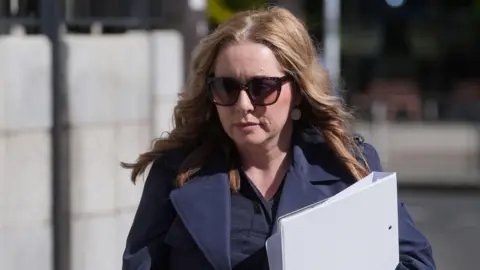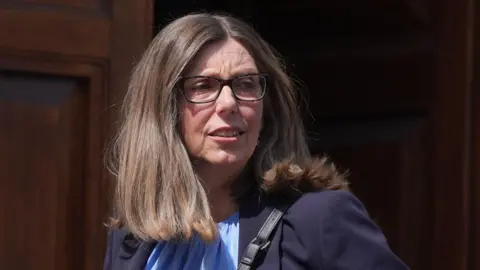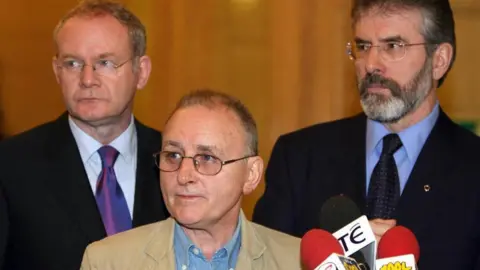Reporter rejects 'reckless journalism' claim in Adams libel trial
 PA Media
PA MediaThe BBC Spotlight reporter who made the programme which alleged former Sinn Féin leader Gerry Adams sanctioned a spy's murder has rejected a claim it was "reckless" journalism.
Jennifer O'Leary was speaking as she completed giving her evidence at a libel trial at the High Court in Dublin.
Mr Adams, 76, is suing the BBC over a 2016 programme about the killing of Denis Donaldson and an accompanying online article.
He denies any involvement.
Ms O'Leary was cross-examined by his barrister, Tom Hogan SC, on Thursday morning.
Journalism 'done in good faith'
He claimed she ran the story as she had "ticked all the boxes", including incorporating Mr Adams' denial, but did not stand over the truthfulness of the allegation.
It was made by an anonymous source, Martin, an informer in the IRA, who featured in the programme.
"The journalism was done in good faith," Ms O'Leary said.
"It wasn't an allegation made by me. It wasn't treated recklessly."
She "absolutely refuted" Mr Hogan's assertion she had "no regard" if the allegation were true or false.
 PA Media
PA MediaMs O'Leary also stated she did not have "carte blanche" to say what she wanted about the former Sinn Féin leader on the basis he normally does not take legal action.
Mr Hogan described the sources who corroborated Martin's claim as "disaffected" republicans and "indiscreet" security people.
Ms O'Leary responded: "No, that is a wrong representation of the credible sources I spoke to.
"I wasn't going to any Tom, Dick or Harry to check the journalism."
She accepted that while she had five additional sources around the allegation, it was not mentioned in the broadcast as "it ran the risk of being unfair to Mr Adams".
Her source Martin had to be anonymous as the IRA was trying to identify informers at the time, she added.
The deputy editor of Spotlight at the time of the broadcast, Gwyneth Jones, was then called as the BBC's second witness.
 PA Media
PA MediaMs Jones told the jury that the head of the corporation's internal legal department, based in London, was consulted about the programme from an early stage.
Mr Adams also claims he was defamed in a BBC online story based on the Spotlight programme which was published the following day, 20 September 2016.
It was headlined "Gerry Adams 'sanctioned Denis Donaldson killing'".
Ms Jones was asked under cross-examination why the article remained online after nine years and was not amended to state Mr Adams was suing over it.
"I am a journalist not a lawyer. A decision like that would be taken by legal team," Ms Jones said.
"I saw no reason to take it down. We are standing by our journalism."
She added there are separate online articles reflecting the fact Mr Adams is taking legal action.
The court was told the jury will not hear evidence from Jeremy Adams, who was Spotlight's editor in 2016, as he had since left the BBC amidst bullying allegations.
Mr Adams' lawyer claimed the workplace atmosphere had been "toxic".
Ms Jones replied: "I completely disagree. I don't understand why this is relevant."
Who was Denis Donaldson?
 PA Media
PA MediaMr Donaldson was once a key figure in Sinn Féin's rise as a political force in Northern Ireland but he was found murdered in 2006 after it emerged he had been a spy.
He was interned without trial for periods in the 1970s.
After the signing of the Good Friday Agreement, Sinn Féin appointed Mr Donaldson as its key administrator in the party's Stormont offices.
In 2005, Mr Donaldson confessed he was a spy for British intelligence for two decades, before disappearing from Belfast.
He was found dead in a small, run down cottage in Glenties, County Donegal.
Who is Gerry Adams?
Mr Adams was the president of republican party Sinn Féin from 1983 until 2018.
He served as MP in his native Belfast West from 1983 to 1992 and again from 1997 until 2011 before sitting as a TD (Teachta Dála) in the Dáil (Irish parliament) between 2011 and 2020.
Mr Adams led the Sinn Féin delegation during peace talks that eventually brought an end to the Troubles after the signing of the Good Friday Agreement in 1998.
He was detained in the early 1970s when the government in Northern Ireland introduced internment without trial for those suspected of paramilitary involvement.
Mr Adams has consistently denied being a member of the IRA.
